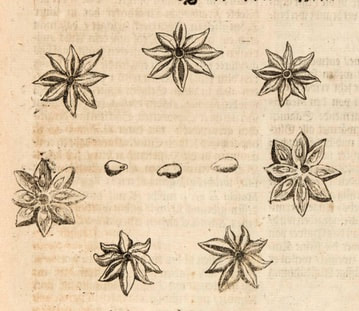Illicium, Star Anise, Da Hui Xiang 大茴香
Anisum Stellatum
Da Hui Xiang (TCM)
Badyan Khatai (Unani)
Da Hui Xiang (TCM)
Badyan Khatai (Unani)
Star Anise
Icones Plantarum Medcio-oeconomico, Vietz, 1800–1806
Icones Plantarum Medcio-oeconomico, Vietz, 1800–1806
Museum Museorum, Valentini, 1704
Botanical name:
Illicium verum
Parts used:
Fruit
Temperature & Taste:
Very Warm, dry. Pungent
Classification:
M. Warm to Expel Cold
Illicium verum
Parts used:
Fruit
Temperature & Taste:
Very Warm, dry. Pungent
Classification:
M. Warm to Expel Cold
Uses:
1. Moves Qi::
-Wind, colic, bloating
-spasmodic pain of the Stomach or Intestines
-Hernia
2. Clears Damp, Awakens the Spleen:
-indigestion, loose stool
-poor appetite (Commission E)
-Morning Sickness
3. Warms the Kidneys, Clears Wind-Damp:
-promotes Urine when obstructed by Cold or Damp
-Lower back pain from Cold Kidneys
-Rheumatism
-Paralysis
4. Clears Phlegm, Stops Cough:
-Cold Cough, Bronchitis (Commission E)
-Catarrh
5. Externally:
-distilled oil can be used topically for fungal infections
Dose:
Decoction: 3–9 grams
Powder: 500mg–3 grams
Substitute:
1. Fennel seed; Aniseed
Decoction: 3–9 grams
Powder: 500mg–3 grams
Substitute:
1. Fennel seed; Aniseed
Main Combinations:
In TCM it is often combined with Fennel, especially for cold pain of the lower abdomen, and for Hernia. Aniseed is of course also regularly combined with Fennel seed in the Western Tradition.
1. Catarrh, Gout, Pruritus, Sassafras with Sage, Nutmeg, Cinnamon, Star Anise
2. Fever, Menyanthes with Willow bark, Ceylon Cinnamon, Cinchona, Gentian, Star Anise
Cautions:
1. Not used in Deficient Heat
Main Preparations used:
Distilled Oil
1. Not used in Deficient Heat
Main Preparations used:
Distilled Oil

